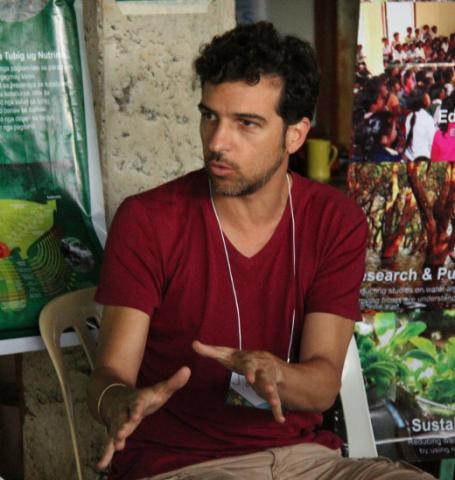The experience of walking through the forest helped to set the scene of the JCAP Reconciling with Creation Reflection Workshop by immersing us in nature and helping us to reflect on the interconnectedness of all things.
The walk was especially inspiring because it was led by local young people proudly sharing their intimate knowledge of their land. Partly supported by the Flights for Forests programme of Jesuit Conference of Asia Pacific, the work is also exciting because it manages to demonstrate in real life how a degraded forest can be regenerated into a healthy ecosystem that produces something that everyone needs – clean water and hope.
Importantly, the conversations we had along the way reminded me that environmental problems are social problems that demand holistic responses based on community engagement, a long term vision, perseverance, local knowledge and leadership based on trust.
A strong pillar of this community-based natural resource management programme is the school, as its active involvement provides a real life educational tool for teachers and a hands-on activity for students, some of whom I learned, are starting to imagine a professional path in areas of environmental management and social change.
 The programme also made me reflect on the importance of engaging and respecting the knowledge and dynamism of young people, whom in many cases are caught in this perilous transition from school to the work force and the confusing frontier of community life versus the global push for individuality and profits.
The programme also made me reflect on the importance of engaging and respecting the knowledge and dynamism of young people, whom in many cases are caught in this perilous transition from school to the work force and the confusing frontier of community life versus the global push for individuality and profits.
Thus, it was great to witness this team of young people working in their language and sharing their extensive knowledge of ecology to regenerate the ecosystem. For example, we learned about the different types of bamboo, the need to eradicate invasive species, the arduous work involved in relocating seedlings, the importance of fire management and the patience and commitment it takes to invest in a long term vision. I also believe it was important for them to hear positive feedback from visitors, as working in isolation is sometimes challenging and there are only limited opportunities to put things in perspective.
Despite the tangible accomplishments, there are also powerful socio political and economic threats to the region and the current efforts. New migrants with limited understanding of the local context, a convoluted land tenure system that promotes land fragmentation, a push for private gains and monoculture, in addition to a tenuous political landscape and governance structures put pressure on this fragile ecosystem and the people that depend on it.
And that is why witnessing a successful programme operating in this complex context is inspiring. It highlights the importance of a continuous dialogue and engagement with all stakeholders, especially those lacking an understanding of the benefits of such a programme. It also underlines how critical it is to embrace and nurture local knowledge and utilize local resources to demonstrate that with hard work things can improve.
Jorge Basave works with Jesuit Social Services in Australia and is Community Development Manager for its work in the Northern Territory. He was one of 35 people from 10 countries within the Jesuit Conference Asia Pacific who participated in recent JCAP Reconciliation with Creation Reflection Workshop held in Bendum, Philippines.
Related stories:
Renewing life and mission in ecology
Reconciling with creation and renewing mission in Micronesia and beyond

